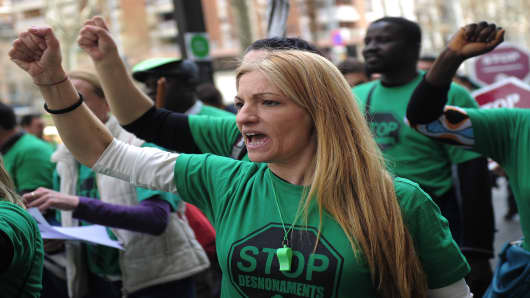Spanish protesters seeking to stop a wave of evictions have resorted to embarrassing politicians at their homes over harsh mortgage laws that have multiplied the pain of a property crash in the recession-hit country.
Inspired by Latin American human rights campaigns from the 1990s, the "escraches" - Argentine slang for denunciation - have involved protesters posting flyers and shouting slogans on the doorsteps of a number of politicians over the past fortnight.
A furious government this week vowed to punish campaigners it accuses of harassing members of the ruling People's Party (PP), after one said protesters had banged on his door and shouted insults while his children were in the house.
(Read More: Bank of Spain: Economy to Sink Deeper Into Recession)
"We all have a right to defend our ideas, but intimidation can never be a form of participating in public issues," Prime Minister Mariano Rajoy, targeted by an attempted protest at his wilderness retreat last weekend, told his party on Wednesday.
"I condemn these acts."
The demonstrations echo more widespread anger over the handling of a deep economic crisis, and some believe other attention-seeking tactics will follow as people recognize the limited impact of regular large gatherings that began last year.
"There is a certain lassitude - the demonstrations grouping together tens of thousands of people don't seem to be as effective as before," said Tomas Alberich, a sociology professor at the University of Jaen.
The evictions of growing numbers of Spaniards from their homes has emerged as a key protest front in a country that has spawned countless demonstrations since the government introduced deep spending cuts in 2012 to tackle a gaping deficit.
A 41-billion-euro European bailout of Spanish banks hit by a property crash in 2008 added to anger and prompted colorful protests, including one by flamenco-dancing troupes.
(Read More: Reasons to Believe Spain's Recovery Is Not Far Away)
Late last year a series of suicides of people who had recently been forced out of their homes thrust evictions to the fore, pushing the government to offer the most vulnerable families two years' breathing room on mortgage payments.
The measures were seen by many as too weak to address a broader problem: property foreclosure cases rose nearly fourfold from 2008 to 2012 compared to the 2003-2007 period, court data shows. Last year foreclosure cases opened by courts increased 18 percent from 2011 to nearly 92,000.
Campaigners now want drastic changes in mortgage rules, including for debts to be cancelled when a house is handed over - a shake-up that could hurt banks. At present, the debts are not even cancelled in death, making Spain's mortgage laws much harsher than those in many other countries.
The Platform for Mortgage Victims, PAH by its Spanish acronym, has persuaded parliament to debate a 'people's initiative' on mortgages that will be voted on in the coming months, after an online petition with 1.5 million backers.
But the center-right PP last week introduced amendments to the initiative that would cancel out some of the key demands.
From Buenos Aires to Barcelona
The PAH is promoting the "escraches" - tactics which originated in Argentina and Chile with demonstrations outside the homes or work places of former officials linked to military dictatorships. In Chile, the protests were called "funes".
The "escraches" evolved during Argentina's economic crisis in the early 2000s, with lawmakers blamed for the financial woes becoming targets. Critics in Argentina say the protests, which sometimes involved egg-throwing, led to a lynch mob mentality.
In Spain, the PAH insist they are not promoting violence, as they target PP politicians bearing round red and green placards symbolizing the buttons used in parliament to vote yes and no.
Some of the protests at homes or public spots such as train stations have been filmed and posted on YouTube.
"Our protocol is to go and try and talk to the member of parliament, not all at once but taking them aside and putting them face to face with a real case of someone who has been evicted," said David Cobo, a spokesman for PAH in the town of Alcala de Henares near Madrid.
Spain's Interior Minister on Monday said escrache participants would be punished and identified, though the measures have attracted criticism from some police unions.
Other PP members have courted controversy by likening the tactics to the terror sown during more than four decades in Spain by Basque separatist group ETA.
Few other protest groups have so far shown signs of adopting the "escraches", though they are trying to up the ante in different ways.
"For now we've not contemplated that...we want a solution through local councils, communities and governments," said Humberto Gestido, a spokesman for a group of savers in the northern region of Galicia who were sold complex products by lenders and had to take losses in the banking bailout.
Those protesters spent most of Easter week locked up in the town hall of the small town of Moana, disrupting assemblies as they campaign for ways to get their money back.



